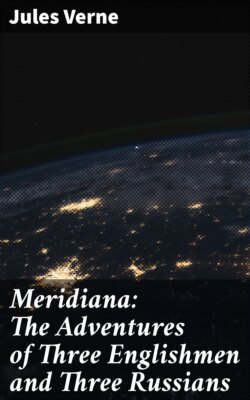Читать книгу Meridiana: The Adventures of Three Englishmen and Three Russians - Jules Verne - Страница 5
На сайте Литреса книга снята с продажи.
CHAPTER III.
ОглавлениеTable of Contents
THE LAND JOURNEY.
These introductions over, William Emery put himself at the disposal of the new arrivals, for in his position of astronomer at the Cape, he was inferior in rank to Colonel Everest, a delegate of the English Government, and, with Matthew Strux, joint president of the commission. He knew, as well, that he was a distinguished man of science, famous for his reductions of the nebulæ and his calculations of the occultations of the stars. He was a cold, methodical man, of about fifty years of age, every hour of his life being portioned out with mathematical accuracy. Nothing unforeseen ever happened to him, and his punctuality in every thing was like that of the stars in passing the meridian, and it might be said that all his doings were regulated by the chronometer. William Emery knew all this, and had therefore never doubted that the commission would arrive on the appointed day. During this time he was waiting for the Colonel to tell him the object of this mission to South Africa; but as he was still silent on the point, Emery thought it better not to ask any questions, as very likely the hour fixed in the Colonel's mind for the subject had not yet come.
Emery also knew by repute the wealthy Sir John Murray, who (almost a rival to Sir James Ross and Lord Elgin) was, although without office, an honour to England by his scientific labours. His pecuniary sacrifices to science were likewise considerable, for he had devoted £20,000 to the establishment of a giant reflector, a match for the telescope at Parson Town, by whose means the elements of a number of double stars had just been determined. He was a man of about forty years of age, with an aristocratic bearing, but whose character it was impossible to discover through his imperturbable exterior.
As to the three Russians, Strux, Palander, and Zorn, their names were also well known to William Emery, although he was not personally acquainted with them. Nicholas Palander and Michael Zorn paid a certain amount of deference to Matthew Strux, as was due to his position, if it had not been to his merit.
The only remark that Emery made was that they were in equal numbers, three English and three Russians; and the crew of the "Queen and Czar" (for that was the name of the steamboat) consisted of ten men, five English and five Russians.
"Mr. Emery," said Colonel Everest, when the introductions were over, "we are now as well acquainted as if we had travelled together from London to Cape Voltas. Besides, your labours have already earned you a just renown, and on that account I hold you in high esteem. It was at my request that the English Government appointed you to assist in our operations in South Africa."
William Emery bowed in acknowledgment, and thought that he was now going to hear the object of the scientific commission to the southern hemisphere; but still Colonel Everest did not explain it.
"Mr. Emery," he went on, "are your preparations complete?"
"Quite, Colonel," replied the astronomer. "According to the directions in Mr. Airy's letter, I left Cape Town a month ago, and went to the station at Lattakoo, and there I collected all the materials for an expedition into the interior of Africa, provisions, waggons, horses, and bushmen. There is an escort of 100 armed men waiting for you at Lattakoo, and they will be under the command of a clever and celebrated hunter, whom I now beg to present to you, the bushman Mokoum."
"The bushman Mokoum!" cried the Colonel (if his usual cold tone could justify such a verb), "the bushman Mokoum! I know his name perfectly well."
"It is the name of a clever, brave African," added Sir John Murray, turning to the hunter, who was not at all discomposed by the grand airs of the Europeans.
"The hunter Mokoum," said William Emery, as he introduced his companion.
